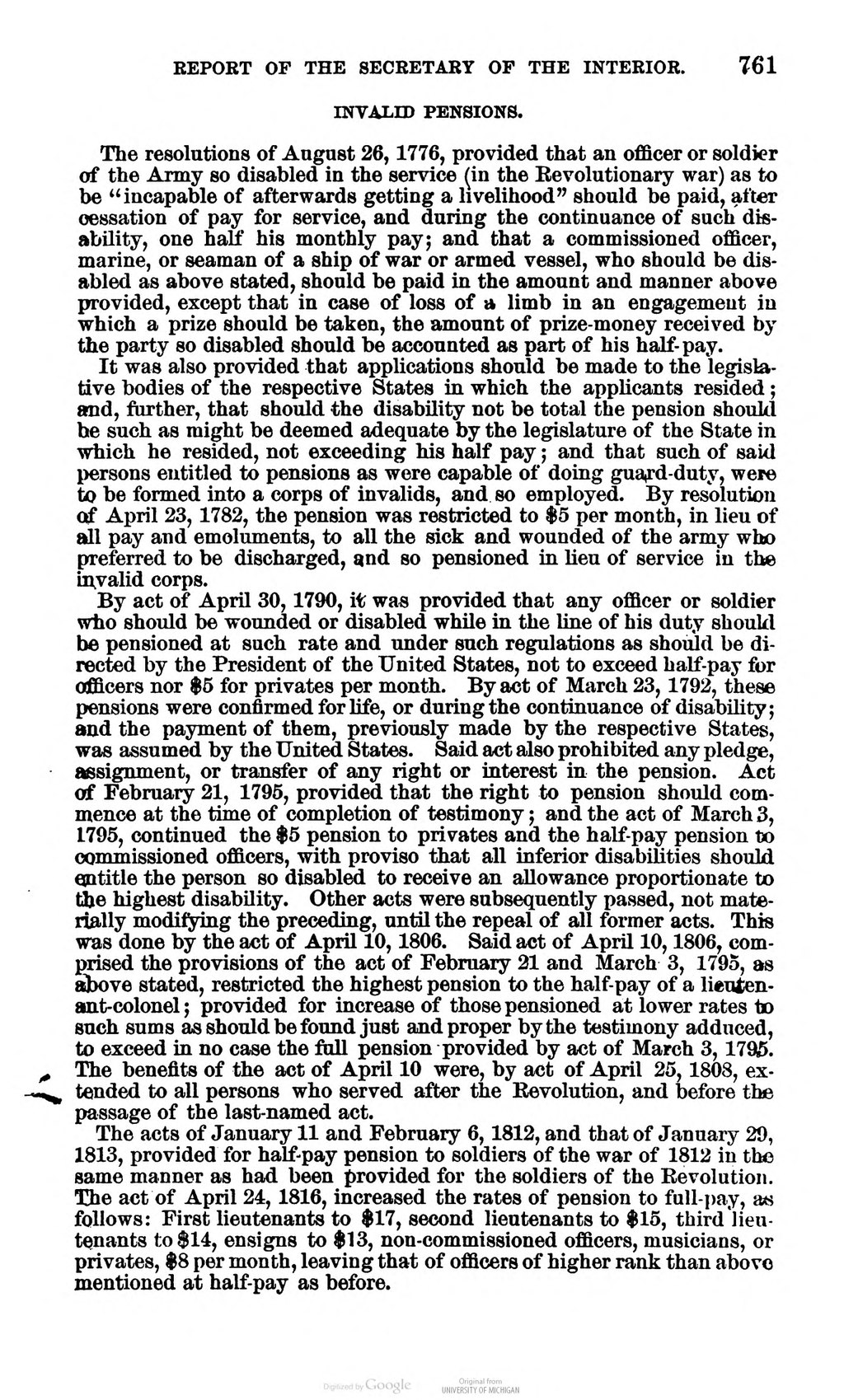INVALID PENSIONS
The resolutions of August 26, 1776, provided that an officer or soldier of the Army so disabled in the service tin the Revolutionary war) as to be "incapable of afterwards getting a livelihood" should be paid, after cessation of pay for service, and during the continuance of such disability, one half his monthly pay; and that a commissioned officer, marine, or seaman of a ship of war or armed vessel, who should be disabled as above stated, should be paid in the amount and manner above provided, except that in case of loss of as limb in an engagement in which a prize should be taken, the amount of prize-money received by the party so disabled should be accounted as part of his half-pay.
It was also provided that applications should be made to the legislative bodies of the respective States in which the applicants resided; and, further, that should the disability not be total the pension should he such as might be deemed adequate by the legislature of the State in which he resided, not exceeding his half pay; and that such of said persons entitled to pensions as were capable of doing guard-duty, were to be formed into a corps of invalid, and so employed. By resolution af April 23, 1782, the pension was restricted to $5 per month, in lieu of all pay and emoluments, to all the sick and wounded of the army who preferred to be discharged, and so pensioned in lieu of service in the invalid corps.
By act of April 30, 1790, it was provided that any officer or soldier who should be wounded or disabled while in the line of his duty should be pensioned at such rate and under such regulations as should be directed by the President of the United States, not to exceed half-pay for officers nor $5 for privates per month. By act of March 23, 1792, these pensions were confirmed for life, or during the continuance of disability, and the payment of them, previously made by the respective States, was assumed by the United States. Said act also prohibited any pledge, assignment, or transfer of any right or interest in the pension. Act of February 21, 1795, provided that the right to pension should commence at the time of completion of testimony; and the act of March 3, 1795, continued the $5 pension to privates and the half-pay pension to commissioned officers, with proviso that all inferior disabilities should entitle the person so disabled to receive an allowance proportionate to the highest disability. Other acts were subsequently passed, not materially modifying the preceding, until the repeal of all former acts. This was done by the act of April 10, 1806. Said act of April 10, 1806, comprised the provisions of the act of February 21 and March 3, 1795, as above stated, restricted the highest pension to the half-pay of a lieutenant-colonel; provided for increase of those pensioned at lower rates to such sums as should be found just and proper by the testimony adduced, to exceed in no case the full pension 'provided by act of March 3, 1795. The benefits of the act of April 10 were, by act of April 25 1808, extended to all persons who served after the Revolution, and before the passage of the last-named act.
The acts of January 11 and February 6, 1812, and that of January 29, 1813, provided for half pay pension to soldiers of the war of 1812 in the same manner as had been provided for the soldiers of the Revolution. The act of April 24, 1816, increased the rates of pension to full-pay, as follows: First lieutenants to $17, second lieutenants to $15, third lieutenants to $14, ensigns to $13, non-commissioned officers, musicians, or privates, $8 per month, leaving that of officers of higher rank than above mentioned at half-pay as before.
